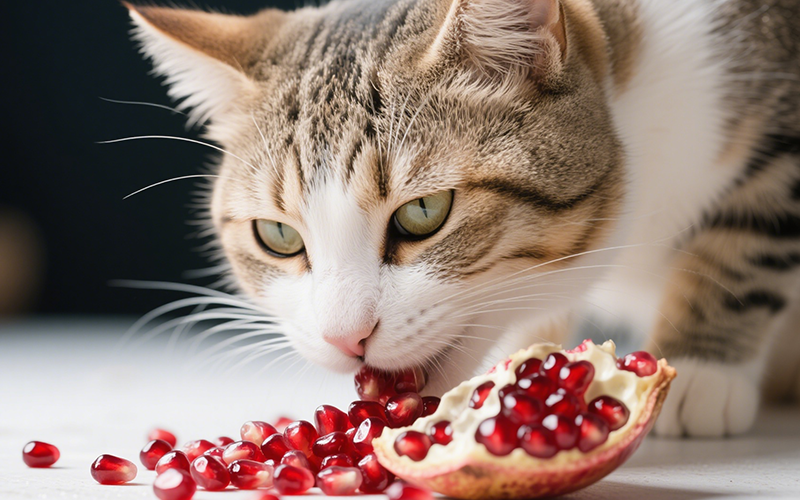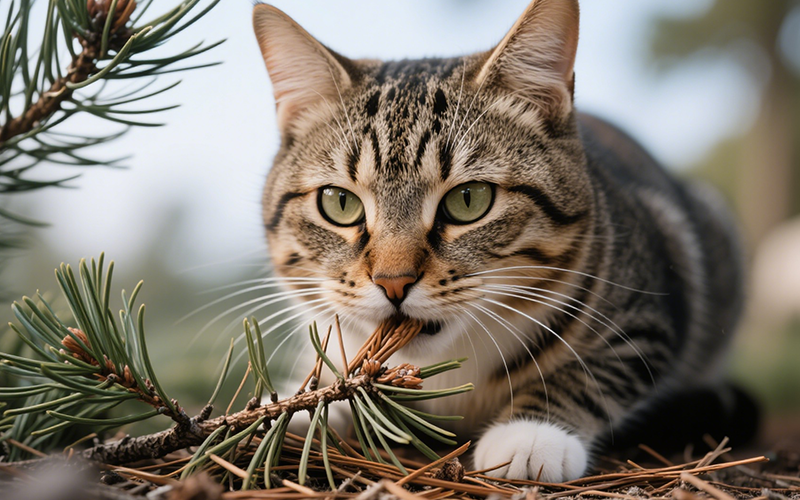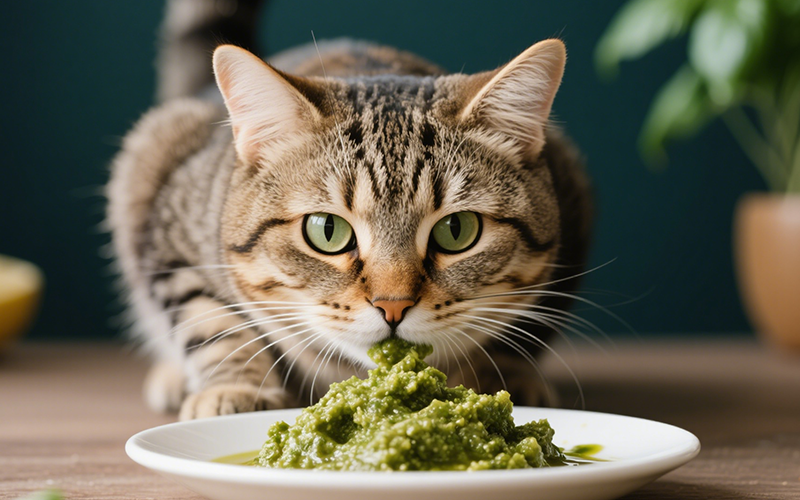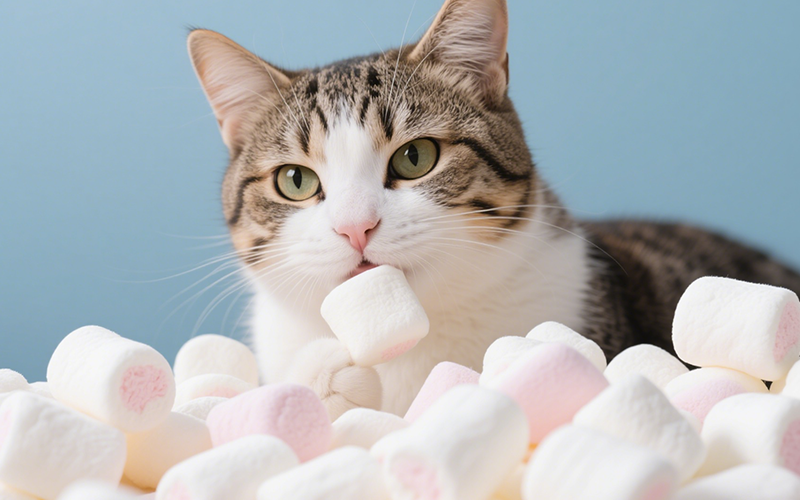Pomegranate Peril: Can Cats Eat the Seeds Safely? A Vet-Reviewed Guide
- 25 Apr 2025 09:28
Pomegranates, often celebrated as a "superfruit" for humans, are packed with antioxidants and boast a unique sweet-tart flavor. Their jewel-like arils (the fleshy part often mistaken for the entire seed) add vibrancy to salads and desserts. As loving cat owners, seeing these bright red gems might make us wonder if we can share this healthy treat with our feline companions. This leads to the crucial question: can cats eat pomegranate seeds? While sharing human foods can sometimes seem like a kind gesture, pomegranates, particularly their seeds, pose significant risks to cats and are generally not recommended by veterinary professionals. This comprehensive guide will delve into the reasons why pomegranates are unsuitable for cats, exploring the dangers of the seeds, the limited benefits of the fruit itself, and what to do if your cat accidentally ingests some.

Understanding the Pomegranate: Aril vs. Seed
Before evaluating the safety, it's essential to understand the structure of a pomegranate. What we commonly call the "seed" is technically an **aril**. Each aril consists of: 1. **The Juicy Sac:** The sweet, fleshy, edible part that contains the juice. 2. **The Inner Seed:** A small, hard, fibrous seed located within the juicy sac. When discussing whether cats can eat pomegranates, we must consider both the outer fleshy aril and the hard inner seed. While the flesh itself isn't directly toxic in tiny amounts, the inner seed presents the most significant danger, and even the flesh isn't ideal for felines.
The Core Question: Are Pomegranate Seeds Safe for Cats?
The overwhelming veterinary consensus is **NO, pomegranate seeds (specifically the hard inner seeds) are not safe for cats**, and the fruit itself (the aril) is not recommended. There are several compelling reasons for this conclusion:
1. Gastrointestinal Obstruction (The Most Severe Risk)
This is the primary and most life-threatening danger associated with the hard inner seeds of the pomegranate.
Indigestible Nature:** Cats are obligate carnivores with digestive systems designed primarily for meat. The hard, fibrous inner seeds of pomegranates are indigestible to them.
Blockage Formation:** Due to their small size and hardness, these seeds can easily become lodged in a cat's narrow gastrointestinal tract, particularly the small intestine. This creates a physical blockage, preventing the passage of food, water, and gas.
Emergency Situation:** An intestinal obstruction is a **critical veterinary emergency**. It can cut off blood supply to the intestinal wall, causing tissue death (necrosis), and potentially lead to a rupture (perforation), spilling intestinal contents into the abdomen and causing severe infection (peritonitis). This condition requires immediate veterinary diagnosis (often involving X-rays or ultrasound) and typically necessitates emergency surgery.
Symptoms of Blockage:** Watch for persistent vomiting (especially after eating or drinking), complete loss of appetite, severe lethargy, abdominal pain (crying when touched, hunching), dehydration, and straining or inability to defecate.
The sheer risk of intestinal blockage from the hard inner seed is reason enough to definitively state that cats should not eat pomegranate seeds.
2. Choking Hazard
The small, hard seeds can also pose a choking risk, particularly for kittens or smaller cats, or those that tend to gulp things down quickly. They could potentially become lodged in the throat or airway.
3. Digestive Upset (From Seeds and Flesh)
Even if the seeds don't cause a blockage, both the seeds and the fruit flesh (aril) can lead to digestive upset:
Irritation:** The hard seeds can physically irritate the lining of the stomach and intestines as they pass through (if they don't get stuck).
Acidity and Tannins:** Pomegranate flesh contains tannins and is relatively acidic. These components can irritate a cat's sensitive stomach, leading to symptoms like:
Vomiting
Diarrhea
Abdominal discomfort
Loss of appetite
High Sugar Content:** The aril flesh is high in natural sugars. Cats have no dietary requirement for sugar, and consuming it offers no benefit, contributing only empty calories. Excessive sugar can potentially lead to weight gain over time and isn't ideal for diabetic cats.
The combination of physical irritation from seeds and chemical irritation from the flesh makes the entire pomegranate aril problematic, even if the seeds were somehow removed. Asking "can cats eat pomegranate seeds?" must consider the risks of both components.
Are There Any Benefits to Offset the Risks?
Pomegranates are lauded for their high antioxidant content (like punicalagins and anthocyanins) in humans. However, these benefits do not readily translate to cats in a safe or practical way: * **Risks Outweigh Benefits:** The potential benefits of antioxidants are completely overshadowed by the severe risks of choking, intestinal obstruction, and digestive upset. * **Species-Appropriate Sources:** Cats, as obligate carnivores, derive their necessary nutrients, including antioxidants processed differently, from a balanced, meat-based diet. If antioxidant supplementation is deemed necessary by a vet for a specific health condition, safe, cat-specific supplements are available. * **Limited Research:** There is little to no scientific evidence supporting specific health benefits of pomegranates or their seeds *for cats*. Trying to provide potential antioxidant benefits via pomegranate seeds is simply too dangerous and biologically inappropriate for felines.
What About Pomegranate Juice or Extract?
* **Pomegranate Juice:** Pure pomegranate juice is not recommended for cats. It is high in sugar and acidity, which can cause digestive upset (vomiting, diarrhea) and contribute unnecessary calories. Cats should primarily drink fresh water. * **Pomegranate Extract:** Some high-end pet foods or supplements might contain minuscule amounts of processed pomegranate *extract*, where potentially beneficial compounds are isolated, and problematic components (like hard seeds, excessive sugar/fiber) are removed. This is vastly different from feeding the actual fruit or seeds and should only be provided via products specifically formulated and dosed for pets.
Help! My Cat Ate Pomegranate Seeds! What Should I Do?
If you suspect or know your cat has ingested pomegranate arils or seeds, **act immediately**: 1. **Prevent Further Access:** Remove any remaining pomegranate immediately. 2. **Estimate Quantity:** Try to determine how much was eaten – just a lick of juice, one aril, or several? Critically, did they likely ingest the hard inner **seed(s)**? 3. **Contact Your Veterinarian or Emergency Pet Clinic WITHOUT DELAY:** This is the most crucial step, especially if seed ingestion is suspected. **Do not wait for symptoms.** Intestinal blockage is an emergency where time is critical. * Inform them clearly: "My cat may have ingested pomegranate seeds." * Provide details: Estimated amount, parts eaten (flesh vs. seed), time of ingestion, cat's age/weight/breed, and any current symptoms. 4. **Follow Veterinary Advice Explicitly:** They will assess the risk. Recommendations might include: * Bringing the cat in immediately for examination. * Diagnostic imaging (X-rays or ultrasound) to check for seeds and potential obstruction. * Inducing vomiting (ONLY if deemed safe and appropriate by the vet, often difficult and potentially risky with solid objects). * Hospitalization for observation and supportive care (fluids, anti-nausea medication). * Emergency surgery if an obstruction is diagnosed. 5. **Monitor Closely (If Only Flesh Licked & Vet Advises):** If your cat only had a tiny lick of juice or flesh *and* your vet advises monitoring at home, watch carefully for 24-48 hours for vomiting, diarrhea, lethargy, or loss of appetite. Report any developing signs to your vet. **However, if seed ingestion is even remotely possible, immediate veterinary consultation is always the safest route.** 6. **Do NOT Induce Vomiting at Home:** This can be dangerous and ineffective. Prompt veterinary attention is paramount when dealing with potential pomegranate seed ingestion due to the severe risk of blockage.
Pomegranate Parts & Cat Safety: A Summary Table
This table highlights the risks associated with different parts of the pomegranate for cats:
| Pomegranate Part | Risk Level / Concern for Cats | Primary Dangers & Recommendation |
| Inner Seed (Hard Part) | EXTREMELY DANGEROUS / HIGH RISK | High risk of **intestinal blockage** (life-threatening emergency), choking hazard, G.I. irritation. **AVOID COMPLETELY. Seek immediate vet care if ingested.** |
| Aril Flesh (Juicy Part) | Moderate Risk / Unsuitable | High sugar, acidity, tannins can cause digestive upset (vomiting, diarrhea). Nutritionally unnecessary. Contains the dangerous seed. Avoid. |
| Pomegranate Rind/Peel | High Risk / Unsuitable | Tough, fibrous, indigestible. Choking hazard, potential for G.I. blockage or severe irritation. Avoid. |
| Pomegranate Juice | Moderate Risk / Unsuitable | High sugar, high acidity. Can cause G.I. upset. Stick to fresh water. Avoid. |
| Overall Answer to: Can cats eat pomegranate seeds? | NO. Due to the severe risk of intestinal blockage from the hard inner seeds and potential digestive upset from the flesh, pomegranates are unsafe and should not be fed to cats. | |
Leveraging Pet Tech for Urgent Queries: PettureX App
Facing a potential pet emergency, like your cat eating something dangerous, can be incredibly stressful. Having quick access to reliable general information while you contact your vet can be helpful. The **PettureX** app is designed as a smart companion for pet owners. PettureX features include:
24/7 AI Veterinary Consultation: Use the AI chat for instant general knowledge. Ask questions like "What are the signs of intestinal blockage in cats?" or "Why is fruit bad for cats?". This can help you understand the potential severity and prepare questions for your vet. *Remember, AI provides general information and cannot replace a professional veterinary diagnosis or personalized treatment plan.*
Image Recognition for Pet Health:** Can assist in identifying visual symptoms if they arise (like vomit content, though use discretion).
Animal Species Identification:** Useful for identifying potentially harmful plants or items in your cat's environment.
PettureX serves as a convenient tool for accessing information quickly, supporting responsible pet ownership alongside essential veterinary care.
Safe and Delicious Treat Alternatives for Your Cat
Instead of risking your cat's health with pomegranates, choose treats that are safe, healthy, and species-appropriate: * **Commercial Cat Treats:** Select high-quality treats specifically formulated for cats. Look for meat-first ingredients and minimal fillers. Dental treats or lickable tube treats are popular options. * **Plain Cooked Meat:** Small pieces of unseasoned cooked chicken, turkey, lean beef, or fish (ensure no bones) are excellent protein-rich rewards. * **Freeze-Dried Meat Treats:** Single-ingredient options like chicken, salmon, or minnows are highly palatable and biologically appropriate. * **Catnip:** A pinch of dried or fresh catnip can provide enrichment and enjoyment for responsive cats. * **Cat Grass:** Offer commercially grown oat, wheat, or barley grass for safe nibbling. * **A Small Spoonful of Wet Food:** Use their regular wet food as a special treat. Always introduce new treats slowly and ensure they constitute no more than 10% of your cat's daily caloric intake.
Conclusion: Keep Pomegranates Away from Curious Paws
In conclusion, the definitive answer to "can cats eat pomegranate seeds?" is a firm **no**. The hard inner seeds pose a significant and potentially fatal risk of gastrointestinal obstruction. Furthermore, both the seeds and the surrounding fleshy aril can cause digestive upset due to irritation, acidity, tannins, and sugar content. Pomegranates offer no essential nutritional benefits for obligate carnivores like cats, making the risks entirely unjustifiable. Protect your feline friend by ensuring pomegranates, including discarded seeds and peels, are kept securely out of their reach. If you suspect ingestion has occurred, especially involving the seeds, contact your veterinarian or an emergency clinic immediately. Opt for safe, species-appropriate treats to show your affection, safeguarding your cat's health and preventing a potential medical emergency.
Related

Prickly Problem: Can Cats Eat Pineapple Leaves Safely? A Vet-Reviewed Risk Analysis
- 25 Apr 2025
The Prickly Truth: Can Cats Eat Pine Needles Safely? A Guide for Concerned Owners
- 24 Apr 2025
Pesto & Paws: A Dangerous Mix? Can Cats Eat Pesto Safely?
- 24 Apr 2025
Persimmons and Paws: Can Cats Safely Eat This Autumn Fruit? A Vet-Reviewed Guide
- 23 Apr 2025
Nutritional Yeast for Cats: Savory Sprinkle or Health Hazard? A Vet-Reviewed Guide
- 23 Apr 2025
Marshmallows and Cats: A Puffy Problem? Why Vets Say No to This Sugary Snack
- 22 Apr 2025
Kefir for Kitties? A Veterinarian-Reviewed Guide to Safety, Benefits & Risks
- 22 Apr 2025
The Burning Question: Can Cats Eat Jalapenos? A Comprehensive Safety Guide
- 21 Apr 2025
Cool Temptation: Can Cats Eat Ice Cream Safely? The Vet-Backed Truth
- 21 Apr 2025
Frankly Dangerous: Can Cats Eat Hot Dogs? Vet Explains the Serious Risks
- 16 Apr 2025
